John Henry Hintermeister | |
|---|---|
Johann Heinrich Hintermeister | |
 Painting by John Henry Hintermeister, Foundation of American Government, 1925.[1] At his desk, Washington sits watching Gouverneur Morris sign the Constitution; behind Morris are Roger Sherman, Benjamin Franklin, Robert Morris, Madison and others, and at right Hamilton and Randolph. | |
| Born | Johann Heinrich Hintermeister October 10, 1869 |
| Died | February 10, 1945 (aged 75)[3] Brooklyn |
John Henry Hintermeister (1869-1945) was a Swiss-born American artist, a "well-known illustrator and a painter of American historical scenes," who created paintings for calendars and advertising illustration for the American Art Works company, Brown & Bigelow, Church and Dwight, Louis F. Dow, Kemper-Thomas, the Osborne Co., and Thomas D. Murphy.[3][4] He was the father of another illustrator, Henry Hintermeister.[5] Both men used the signature Hy Hintermeister, causing confusion among collectors.[5] The two worked together, producing more than 1050 illustrations.[4]
Education and career
John Henry Hintermeister was born in Winterthur, Switzerland, and attended the University of Zurich.[4] When his father August Friedrich Hintermeister immigrated to the United States, he remained in Switzerland to finish school, studying art.[4][2] He turned down a professorship in Switzerland and a chance to teach, choosing instead to join his father in the United States in 1890.[4][2] In the United States, he worked as a courtroom artist and as a commercial illustrator.[4] After nearly dying in the Park Place Disaster in August 1891, in which the factory building he was working in collapsed, he stepped away from the in-factory lithography that he was doing at the time to "pursue his dreams."[2][6]
He painted original art for the next 50 years, and had works given copyright in the 1946 registry. His subjects included "landscapes, people, humor, Native Americans, fishing and hunting scenes."[2] His son joined him in the business by the early 1920s and the two worked together, producing artwork for calendars, safety posters, and advertising, with images including kids and dogs, the Boy Scouts of America, "Granny and Gramps" humor illustrations, fishing and hunting scenes.[2]
He became one of the oldest members of the New York City Swiss Society and was "a member of the Salmagundi Club, the Brooklyn Society of Artists, and the Artists Professional League."[3]
Gallery
John Henry Hintermeister signed his paintings "Hy Hintermeister", the same as his son, but he would sometimes add his first initial, signing "J. Hy. Hintermeister."[2]
 1908, Black Canada Grouse. Published by Church and Dwight.
1908, Black Canada Grouse. Published by Church and Dwight.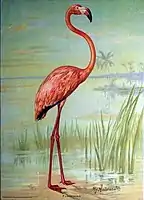 1908, Flamingo, by John Henry Hintermeister. Published by Church and Dwight.
1908, Flamingo, by John Henry Hintermeister. Published by Church and Dwight. 1908, Kingfisher. Published by Church and Dwight.
1908, Kingfisher. Published by Church and Dwight.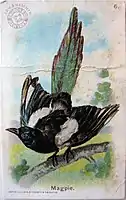 1908, Magpie, by John Henry Hintermeister. Published by Church and Dwight.
1908, Magpie, by John Henry Hintermeister. Published by Church and Dwight.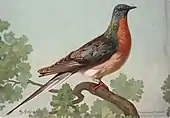 1908, Passenger pigeon by John Henry Hintermeister. Published by Church and Dwight.
1908, Passenger pigeon by John Henry Hintermeister. Published by Church and Dwight.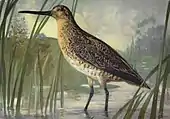 1908, Robin snipe by John Henry Hintermeister. Published by Church and Dwight.
1908, Robin snipe by John Henry Hintermeister. Published by Church and Dwight.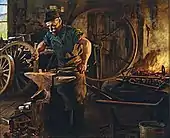 1908, Village Blacksmith, by John Henry Hintermeister
1908, Village Blacksmith, by John Henry Hintermeister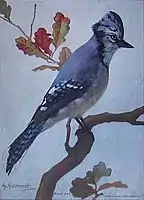 1910, Blue Jay by John Henry Hintermeister. Published by Church and Dwight.
1910, Blue Jay by John Henry Hintermeister. Published by Church and Dwight.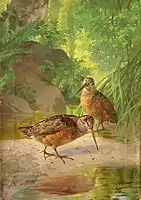 1910, Woodcocks Feeding, by John Henry Hintermeister. Published by Church and Dwight.
1910, Woodcocks Feeding, by John Henry Hintermeister. Published by Church and Dwight.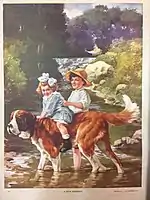 1917, A Safe Crossing by John Henry Hintermeister
1917, A Safe Crossing by John Henry Hintermeister.jpg.webp) 1923, Morning Walk by John Henry Hintermeister
1923, Morning Walk by John Henry Hintermeister_arousing_Hancock_and_Adams_by_Hy_Hintermeister.jpg.webp) 1924, Revere (Paul) arousing Hancock and Adams by Hy Hintermeister. Unclear if John Henry or Henry Hintermeister was creator.
1924, Revere (Paul) arousing Hancock and Adams by Hy Hintermeister. Unclear if John Henry or Henry Hintermeister was creator.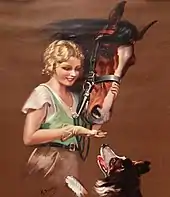 1933, Thoroughbreds by Hy Hintermeister. Not clear which painter created the image.
1933, Thoroughbreds by Hy Hintermeister. Not clear which painter created the image.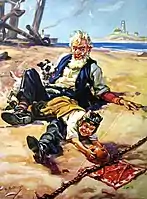 1936, Touchdown by John Henry Hintermeister
1936, Touchdown by John Henry Hintermeister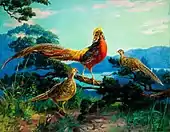 1938, Golden Pheasants by John Henry Hintermeister
1938, Golden Pheasants by John Henry Hintermeister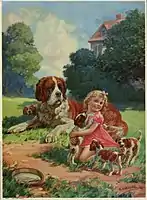 1941,The Home Guard
1941,The Home Guard 1941, Watch 'er fly, Gramp
1941, Watch 'er fly, Gramp.jpg.webp) 1942, A Photo Finish by John Henry Hintermeister. Example of work using the same "Hy Hintermeister" that his son used. The copyright registration made it clear that this was John Henry Hintermeister.[7]
1942, A Photo Finish by John Henry Hintermeister. Example of work using the same "Hy Hintermeister" that his son used. The copyright registration made it clear that this was John Henry Hintermeister.[7]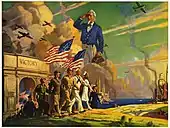 1943/1945, Our heroes return or Welcome home.
1943/1945, Our heroes return or Welcome home.
References
- ↑ Robinson, Raymond H. (1999). "The Marketing of an Icon". George Washington: American Symbol. Hudson Hills. p. 117. ISBN 9781555951481.
Figure 56 John Henry Hintermeister (American 1869-1945) Signing of the Constitution, 1925...Alternatively labeled Title to Freedom and the Foundation of American Government...".
- 1 2 3 4 5 6 7 "HY HINTERMEISTER". Houston Home Journal online. October 21, 2017. Retrieved May 16, 2020.
- 1 2 3 "J. H. Hintermeister, Painter, Illustrator". Brooklyn Eagle. Brooklyn, New York. February 13, 1945.
- 1 2 3 4 5 6 "John Henry "Hy" Hintermeister (1869 - 1945)". askart.com.
- 1 2 "Henry Hintermeister (1897 - 1970)". askart.com.
- ↑ "New York, NY Park Place Building Explosion and Fire, Aug 1891".
It now seems possible that one of the worst disasters which ever happened in this city occurred just after noon to-day. From all that can be learned, bully if not more than 50 people have lost their lives.
The accident came so suddenly that not a single person in the two big buildings at 70 and 72 Park Place escaped alive. There was but one eye witness left to tell the beginning of the accident. This man is named A. A. JOHNSON. He is a janitor in the building at 81 Park Place, directly across the street from where the accident occurred.
He said that he was standing on the steps of 81 at noon, when he heard the sound of an explosion. It came from across the street. It was not loud. Almost immediately the front walls of the two buildings collapsed, and the entire building caved in with a deafening crash. It came so suddenly that it was impossible for a living being to escape from the building.
On the ground floor of one of the numbers was a restaurant that was crowded with people; the other floors were occupied by the Southern Publishing company; S. Loutelle & Co., art designers; Ellis & McDonald, book binders. The owner of the restaurant was of the name ROSENFELD. It was said also, that a portion of the building was occupied by a drug firm, in which the explosion occurred. - ↑ Catalog of Copyright Entries. Part 4. Works of Art, Etc. New Series. Washington D.C.: Library of Congress Copyright Office. 1942. p. 130.
Murphy (Thomas D.) co., Chicago. 5656-5675...Hintermeister, (Hy [i.e. John Henry]). © 1 c. each May 4, 1942.